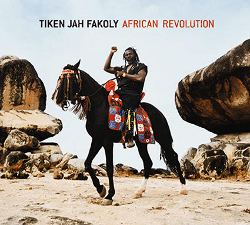Articles about reggae music, reviews, interviews, reports and more...
Tiken Jah Fakoly - African Revolution

Tiken Jah Fakoly - African Revolution
Tiken goes acoustic.
Sampler
After a history lesson ('Cours d'Histoire'), elaborate animadversion on imperialism ('Françafrique') and 'L'Africain' ("L'Afrique ne pleure plus, elle parle" – "Africa doesn't cry anymore, it talks") Tiken Jah Fakoly, today the most important Reggae export from Côte d'Ivoire (Ivory Coast), calls a 'African Revolution'. Talking is not enough anymore, it's time to act. And 'African Revolution' has the power to turn reactionaries into revolutionaries.
 Tiken revolutionized his style, too. With a lot of acoustic elements, 'African Revolution' breaks away from its predecessors. Almost the whole spectrum of Mande instruments, including kora, balafon and ngoni, give the album a "traditional" touch that lets it sound even more African than all the other albums from Tiken Jah Fakoly. Instruments typically used in Reggae music are employed economically. Venerable constraints of the genre are disregarded to an extent that the World Music label would actually suit better.
Tiken revolutionized his style, too. With a lot of acoustic elements, 'African Revolution' breaks away from its predecessors. Almost the whole spectrum of Mande instruments, including kora, balafon and ngoni, give the album a "traditional" touch that lets it sound even more African than all the other albums from Tiken Jah Fakoly. Instruments typically used in Reggae music are employed economically. Venerable constraints of the genre are disregarded to an extent that the World Music label would actually suit better.
The album contains twelve tracks. Title track African Revolution opens the excursion into the breadth of Mande music. Tiken proclaims the revolution of the youths of Africa. Lyrics in Dyoula and English allow a maximum of fans to understand the message. Je Dis Non ! tries a little too hard to please European ears. Together with the Paris-born Nigerian Soul singer Asa, Tiken sings Political War. Thanks to its sing along potential it will surely be part of Tiken's live repertoire in the future. Marley Foly ("Greeting the Marleys") is one of the highlights of the album, it's a tribute sang to the Marley family in Dyoula. Especially the use of the kora spices up the tune. Il Faut Se Lever ("We need to stand up") turns back to the album's leitmotif. We need to stand up to change Africa, sings Tiken Jah, nobody else is going to do that for us. Simimory profits from its unusual beat. In Vieux Père ("Old father"), Tiken talks about the disappointments he feels when returning to Côte d'Ivoire. Sors De Ma Télé ("Get out of my TV") attacks the last word on opinions of western media. The tune is accompanied by an African means of communication, the tamani (talking drum). Also perfectly matching the album's central theme is Votez. The tune talks about the credibility of campaign pledges. Je Ne Veux Pas Ton Pouvoir comes in easy and relaxed, perfectly emphasizes its message: I really don't need your power, your money. Initié ("Thank You") sets another height of the album. Tiken thanks the women of Africa. As regards content and in terms of the catchiness of the melody, the tune can be compared to Sizzla's Thank You Mama. Laisse-Moi M'Exprimer closes the opus and rekurieren again to the leitmotif of the album.
The antagonism of producing "traditional" West African music explicitly for European ears works out even. The album is not only a must-have for fans of Tiken Jah Fakoly. It can broaden the musical horizon of Reggae lovers and will enlarge Tiken's following outside of the Reggae community.
Read more about this topic
Read comments (2)
| Posted by MOHAMED on 10.23.2010 | |
| I like Tiken Jah Fakoly because he is a very good artist. | |
| Posted by valbouena on 11.20.2010 | |
| Tiken Jah Fakoly je te respecte cher tu es le meilleur reggaeman au monde, Jah Rastafari. | |
Comments actually desactivated due to too much spams
Browse by categories
Recommended Articles
Latest articles
Recently addedView all
© 2007-2026 United Reggae. All Rights Reserved. Reproduction in whole or in part is prohibited. Read about copyright
Terms of use | About us | Contact us | Authors | Newsletter | A-Z














